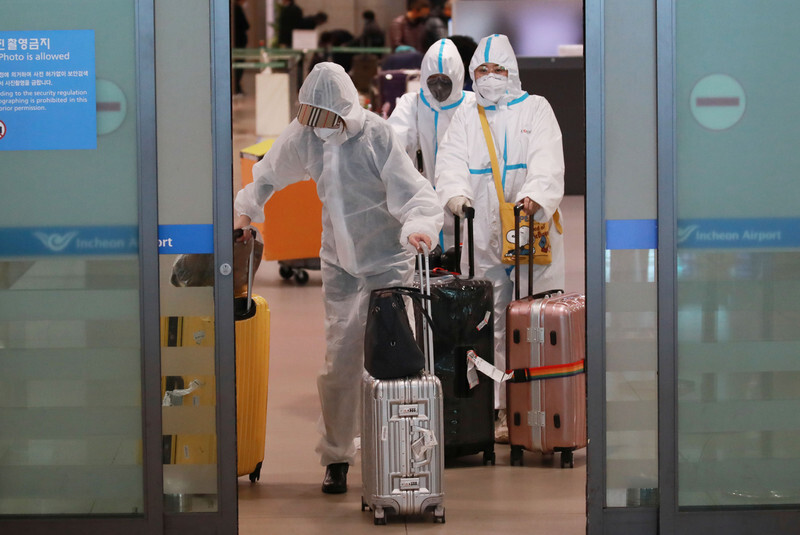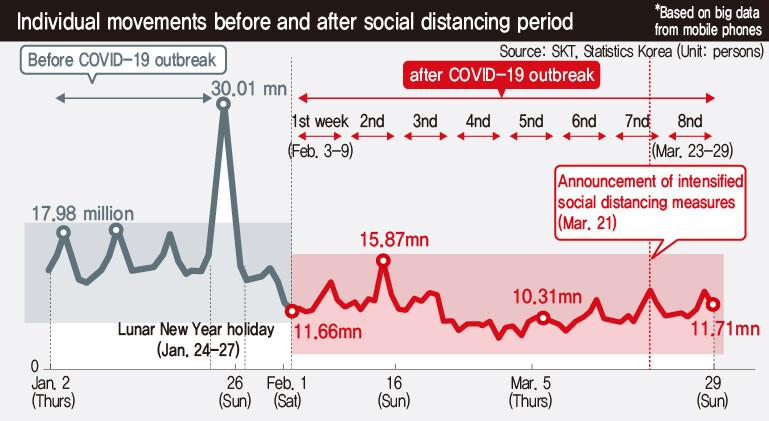hankyoreh
Links to other country sites 다른 나라 사이트 링크
Government announces stricter punishment for quarantine violations, including a year in prison

South Korea’s disease control authorities announced on Apr. 5 that stern punishment awaits a South Korean student who took fever medication to suppress coronavirus symptoms before arriving from the US. The student tested positive for COVID-19 after slipping through quarantine control at Incheon Airport.
Given the continuing arrival of people infected with COVID-19 from overseas, the central government’s disease authorities have decided to work with local governments to create a threefold monitoring system for people under self-quarantine and to extend a regional spot check initiative nationwide.
According to South Korea’s Centers for Disease Control and Prevention (KCDC), 81 new cases of COVID-19 were reported on Saturday and 47 on Sunday, bringing the cumulative total to 10,284. Forty of Saturday’s cases were imported from overseas, with 24 identified in airport quarantine and the other 16 diagnosed in the community following arrival.
Koreans were shocked to learn that the teenage student, who entered the country on Mar. 25, had consumed a large dose of fever medication and passed through airport quarantine without telling officials about the fever. The day after arriving home in Busan, this student tested positive for COVID-19 at a screening clinic. As a result, the passengers aboard the student’s plane are being regarded as having come into close contact with them.

KCDC Deputy Director Kwon Jun-wook promised to “make an example” of the student to prevent similar incidents from occurring. “Taking fever medication and passing through quarantine is very wrong, and also illegal, as it could create grave health issues [for other people given the risk of transmission],” Kwon said. Those who submit false documentation when passing through quarantine could face up to a year in prison or a fine of as much as 10 million won (US$8,111).
In the future, South Korea’s Central Disaster and Safety Countermeasures Headquarters and officials in charge of keeping track of people under self-quarantine at various provincial and municipal levels will be operating a threefold monitoring system. There have been repeated examples of people breaking self-quarantine by going outside without their mobile device, which has the self-quarantine app installed, including a couple in their 50s in Gunpo, Gyeonggi Province, and three foreign students in Gunsan, North Jeolla Province.
As of Apr. 4, there were 37,248 people under self-quarantine, of whom 137 have left their quarantine locations without permission. At the moment, 59 such incidents, involving 63 individuals, are being investigated. The public health authorities plan to verify that people under self-quarantine are staying home around the clock and carry out two unannounced checks a week. The revised Infectious Disease Prevention Act states that, as of Sunday, violations of self-quarantine measures are punishable by up to a year in prison or up to 10 million won in fines.
By Noh Ji-won and Park Da-hae, staff reporters
Please direct comments or questions to [english@hani.co.kr]

Editorial・opinion
![[Column] Season 2 of special prosecutor probe may be coming to Korea soon [Column] Season 2 of special prosecutor probe may be coming to Korea soon](https://flexible.img.hani.co.kr/flexible/normal/500/300/imgdb/original/2024/0426/3317141030699447.jpg) [Column] Season 2 of special prosecutor probe may be coming to Korea soon
[Column] Season 2 of special prosecutor probe may be coming to Korea soon![[Column] Park Geun-hye déjà vu in Yoon Suk-yeol [Column] Park Geun-hye déjà vu in Yoon Suk-yeol](https://flexible.img.hani.co.kr/flexible/normal/500/300/imgdb/original/2024/0424/651713945113788.jpg) [Column] Park Geun-hye déjà vu in Yoon Suk-yeol
[Column] Park Geun-hye déjà vu in Yoon Suk-yeol- [Editorial] New weight of N. Korea’s nuclear threats makes dialogue all the more urgent
- [Guest essay] The real reason Korea’s new right wants to dub Rhee a founding father
- [Column] ‘Choson’: Is it time we start referring to N. Korea in its own terms?
- [Editorial] Japan’s rewriting of history with Korea has gone too far
- [Column] The president’s questionable capacity for dialogue
- [Column] Are chaebol firms just pizza pies for families to divvy up as they please?
- [Column] Has Korea, too, crossed the Rubicon on China?
- [Correspondent’s column] In Japan’s alliance with US, echoes of its past alliances with UK
Most viewed articles
- 1The dream K-drama boyfriend stealing hearts and screens in Japan
- 2‘We must say no’: Seoul defense chief on Korean, USFK involvement in hypothetical Taiwan crisis
- 3[Column] Can we finally put to bed the theory that Sewol ferry crashed into a submarine?
- 4[Editorial] Yoon cries wolf of political attacks amid criticism over Tokyo summit
- 5AI is catching up with humans at a ‘shocking’ rate
- 6S. Korea “monitoring developments” after report of secret Chinese police station in Seoul
- 7Doubts remain over whether Yoon will get his money out of trip to Japan
- 8[Photo] “Comfort woman” survivor calls on president to fulfill promises
- 9[Editorial] Was justice served in acquittal of Samsung’s Lee Jae-yong?
- 101 in 5 unwed Korean women want child-free life, study shows